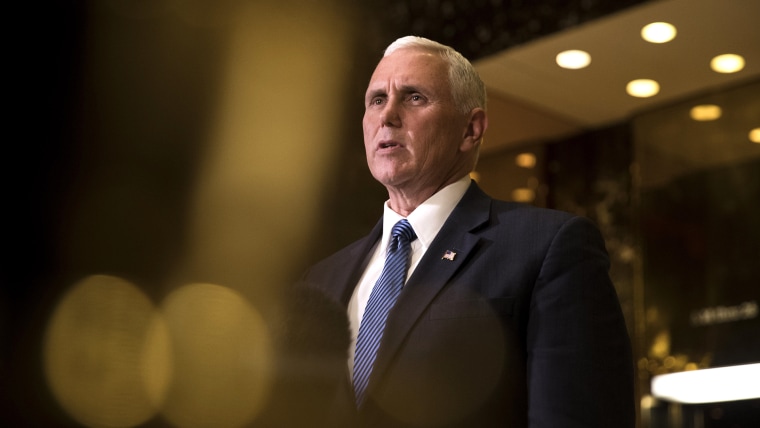If Senate Republicans fail to pass their regressive health care plan, there's quite a bit of support among GOP members to strike a bipartisan deal with Senate Democrats and move on to other issues. There is, however, a radically different approach that's also on the table.
Donald Trump published a tweet two weeks ago in which he said he supports a repeal-and-delay model in which Congress immediately repeals the Affordable Care Act, and then figures out a replacement model at some point down the road. Yesterday, Rush Limbaugh asked Mike Pence if he's on board with such an approach, and the vice president, after dismissing the idea of bipartisan policymaking out of hand, replied:
"We believe if they can't pass this carefully crafted repeal-and-replace bill -- do those two things simultaneously -- we ought to just repeal only, and then have enough time built into that legislation to craft replacement legislation."
First, to describe the current Senate Republican blueprint as "carefully crafted" is plainly ridiculous. For anyone who takes this issue seriously, the legislation is a joke. Second, it's not exactly a good sign that GOP leaders are currently arguing about what to do after their health care legislation dies.
But let's put that aside and consider the substantive, policy implications of what the vice president just publicly endorsed.
The Washington Post's Greg Sargent had a good piece on this a couple of weeks ago.
It's hard to estimate what would happen if Republicans did act on this and Trump signed it. Republicans probably wouldn't be able to repeal some key portions of the Affordable Care Act -- particularly its insurance-market regulations -- via a simple majority "reconciliation" vote. But they could theoretically repeal things with a budgetary orientation, such as the individual mandate and the Medicaid expansion and the subsidies to lower-income people why buy insurance on the exchanges.We can estimate the impact of repealing those things. Indeed, the Congressional Budget Office has already done so, when it analyzed a previous version of a GOP repeal bill over a year ago.
Quite right. As regular readers may recall, the CBO found back in January -- when "repeal an delay" was widely seen as the preferred Republican approach -- that a full repeal along the lines of what Pence described yesterday, would cause premiums to spike and would take health coverage from 32 million Americans over the next decade.
This, according to the sitting president and vice president, is the approach Republican policymakers should embrace if the Senate can't pass the current GOP plan.
One might be tempted to argue that Trump didn't really understand what he was endorsing when he fired off a random tweet based on something he saw on television. That's not much of an argument -- he is, after all, a grown man who happens to be the president of a global superpower -- but as of yesterday, that line doesn't work at all. Pence, after having had time to see the reactions to Trump's recent tweet, said in no uncertain terms that this is the official White House position.
For the record, there's no reason to believe Senate Republicans would actually pass such a bill. This approach has its advocates -- Sen. Ben Sasse (R-Neb.), for example, is apparently the one who persuaded Trump -- but there is no head-count that suggests there's anywhere close to 50 votes for repeal-and-delay legislation. The less conservative GOP senators would surely balk, and even Sen. Bill Cassidy (R-La.) said over the weekend this tack is "a non-starter."
The fact that the White House is on board with such an approach anyway speaks volumes.
